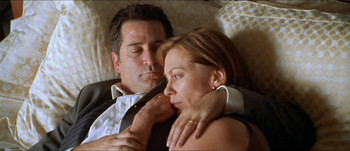On the Mundanity of Spooge
Although obviously Andersonian (Rushmore-ic?), The Squid and the Whale is not a movie that Wes Anderson could have pulled off. Noah Baumbach’s semi-autobiographical film is too raw, naked, painful, and real. It fuses The Royal Tenenbaums and Ordinary People at a genetic level that Seth Brundle would appreciate. Although it acts like a comedy, the movie’s familiarity and truth will be as funny to many people as a slap in the face.

 Adapted from Gillian Flynn’s debut novel, HBO’s Sharp Objects is a whole bunch of greatness that, finally, amounts to not much of anything.
Adapted from Gillian Flynn’s debut novel, HBO’s Sharp Objects is a whole bunch of greatness that, finally, amounts to not much of anything.
 It is in times of crisis that a person learns who his or her true friends are. Alejandro Escovedo discovered he has a lot of friends.
It is in times of crisis that a person learns who his or her true friends are. Alejandro Escovedo discovered he has a lot of friends. The suspension of disbelief, to borrow a hackneyed maxim, is a privilege, not a right; you need to earn it. And last year’s holiday hit The Chronicles of Narnia: The Lion, the Witch, and the Wardrobe doesn’t.
The suspension of disbelief, to borrow a hackneyed maxim, is a privilege, not a right; you need to earn it. And last year’s holiday hit The Chronicles of Narnia: The Lion, the Witch, and the Wardrobe doesn’t.